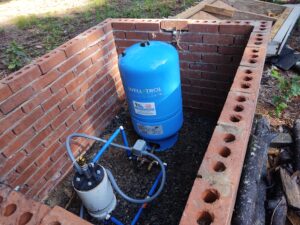Simple And Easy Well Pump Replacement: Revitalizing Your Water Infrastructure with Confidence
Simple And Easy Well Pump Replacement: Revitalizing Your Water Infrastructure with Confidence
Blog Article
Recognizing the Key Parts of Effective Water Filtration Systems

Relevance of Water Filtering Systems
Water filtering systems play a crucial function in making certain access to clean and safe drinking water by effectively getting rid of contaminations and impurities. These systems are vital in dealing with the expanding worries over water quality and the possible health and wellness risks connected with taking in infected water. By using various filtering mechanisms such as reverse osmosis, triggered carbon, and UV sterilization, water filtering systems can efficiently get rid of hazardous materials like germs, infections, heavy steels, and chemicals from the water supply.
In addition, water filtering systems assist to improve the taste and smell of water by eliminating chlorine, sediments, and other contaminants that can affect its high quality. Water Filtration Systems. This improvement in water quality not only makes it extra tasty but additionally encourages individuals to consume an adequate amount of water daily, advertising much better hydration and total health
Sorts Of Filtration Components

Physical filters are designed to physically strain out contaminations from the water. These filters can be constructed from materials like ceramic, carbon, or perhaps sand, and they work by trapping bits bigger than the filter's pores as water travels through.
Chemical filters make use of various chemical procedures to eliminate impurities from the water. Examples include activated carbon filters, which adsorb pollutants, and reverse osmosis membrane layers, which utilize stress to different impurities from the water.
Organic filters use living microorganisms like microorganisms or algae to damage down raw material and toxins in the water. These filters are often used in wastewater treatment plants or all-natural water filtration systems.
Understanding the different kinds of filtration parts is vital for selecting the most suitable water filtration system for particular filtration requirements.
Function of Sediment Filters
Debris filters play an essential role in water filtration systems by effectively recording strong bits put on hold in the water. These filters are typically the initial line of protection in a filtering system, eliminating larger fragments such as sand, silt, dust, and rust before the water relocates via finer filtering stages. By trapping these debris, the filters prevent them from reaching downstream parts, hence prolonging the lifespan and performance of the whole system.
The function of debris filters is crucial in preserving water quality and shielding delicate tools from damage triggered by debris. Additionally, by getting rid of visible fragments, debris filters enhance the quality and taste of the water. Frequently cleaning or changing debris filters is important to guarantee optimum performance. Neglecting this maintenance can lead to blocking, reduced water circulation, and compromised purification efficiency. On the whole, sediment filters are vital components that add significantly to the efficiency of water filtration systems.
Role of Triggered Carbon Filters
Playing an essential function in water purification systems, activated carbon filters contribute in getting rid of contaminations and contaminants from the water system. These filters are Web Site made to adsorb and catch a broad variety of toxins, consisting of chlorine, volatile organic compounds (VOCs), chemicals, and herbicides. The triggered carbon product has a huge area, permitting the efficient trapping of pollutants through a procedure called adsorption. As water passes with the filter, the turned on carbon holds and brings in onto the impurities, ensuring that the water that comes out beyond is cleaner and much safer for usage.
Activated carbon filters are very reliable at enhancing the taste and smell of water by minimizing chemicals that can impact its high quality. They are likewise with the ability of getting rid of particular hefty metals like lead and mercury. In addition, these filters can aid stop the accumulation of useful reference bacteria and algae in water, more improving its general high quality. Due to their convenience and dependability, activated carbon filters are a key part in guaranteeing that water is purified to the highest possible requirements before getting to consumers.
Understanding Reverse Osmosis Equipments
Reverse osmosis systems are innovative water purification systems that utilize a sophisticated procedure to get rid of contaminants and pollutants from alcohol consumption water. These systems function by applying pressure to the water, requiring it via a semi-permeable membrane.
Furthermore, reverse osmosis systems are fairly low-maintenance and can be set up under the sink or in a central purification system, giving hassle-free accessibility to clean water throughout the household. Overall, recognizing just how reverse osmosis systems work can help individuals make educated choices regarding their water filtration demands.
Final Thought
In final thought, effective water filtration systems are vital for guaranteeing tidy and risk-free alcohol consumption water. By understanding the feature and why not find out more role of each element, individuals can make educated choices when selecting a water purification system.
Water filtration systems play an essential duty in ensuring accessibility to tidy and risk-free drinking water by properly eliminating impurities and impurities. By utilizing numerous filtration mechanisms such as reverse osmosis, triggered carbon, and UV sanitation, water filtration systems can effectively remove harmful compounds like microorganisms, infections, heavy metals, and chemicals from the water supply.
Debris filters play a critical role in water filtering systems by effectively recording solid particles put on hold in the water (Well Pump Replacement).Playing an important duty in water purification systems, turned on carbon filters are important in eliminating pollutants and pollutants from the water supply.Reverse osmosis systems are innovative water purification systems that use an innovative procedure to get rid of impurities and contaminations from alcohol consumption water
Report this page